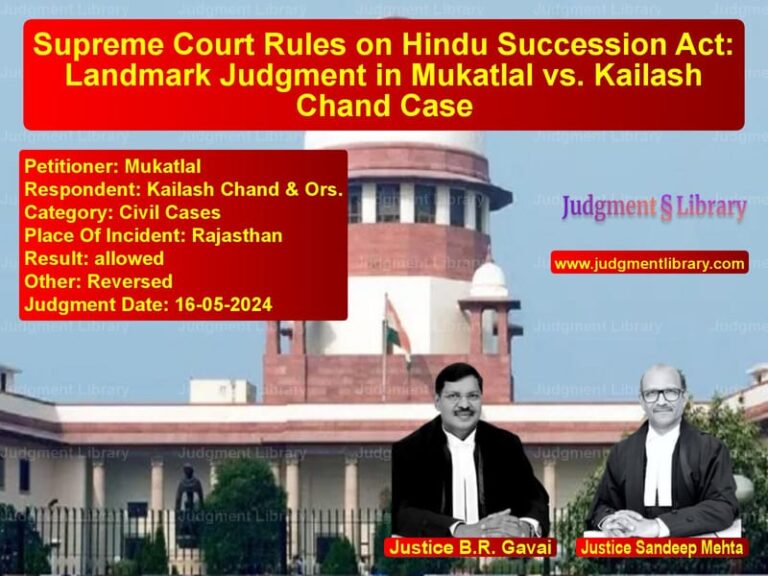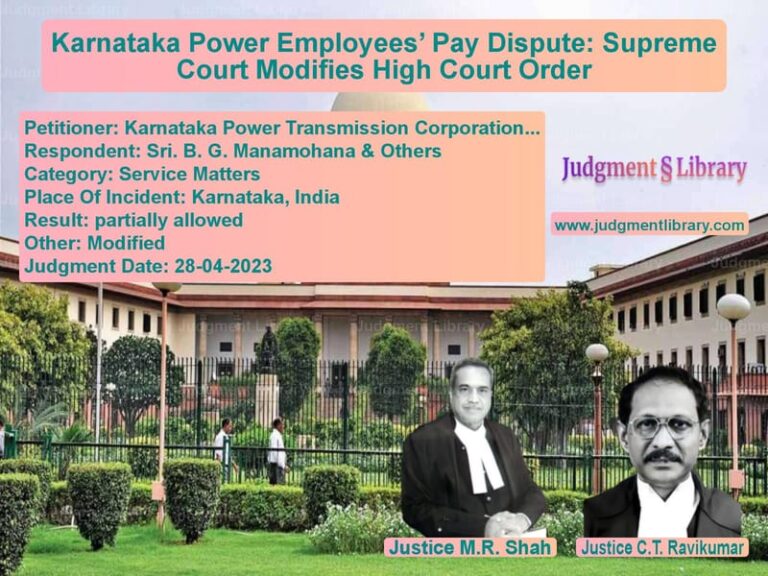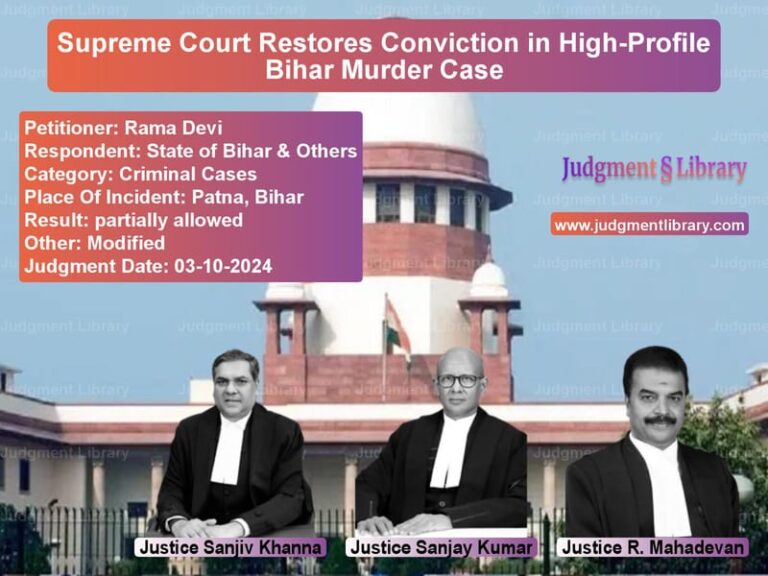Supreme Court Remands Property Dispute Case to High Court for Proper Adjudication
The Supreme Court of India recently ruled on the case of Shivang Mathur vs. Sohan Lal & Ors., a civil appeal arising from a dispute over the amendment of a plaint. The case highlights the procedural significance of a court’s duty to provide reasoned judgments, especially when adjudicating amendments to legal pleadings. The Supreme Court set aside the High Court’s cryptic order and remanded the matter for reconsideration.
Background of the Case
The dispute originated when the petitioner, Shivang Mathur, sought to amend a plaint in an ongoing civil case. The trial court partially allowed the amendment. However, upon revision, the amendment was fully allowed, prompting the respondent, Sohan Lal & Others, to challenge the order in the High Court of Uttarakhand under Article 227 of the Constitution of India.
The High Court dismissed the challenge with a short, non-reasoned order, simply stating:
“In this matter, learned court below has pleased to allow the order of amendment and such order is also discretionary. This Court in exercise of power under Article 227 of the Constitution of India will not interfere with the same. Accordingly, the same is dismissed summarily.”
Aggrieved by this summary dismissal, the petitioner moved the Supreme Court, arguing that the High Court had failed to properly adjudicate the matter.
Arguments of the Petitioner (Shivang Mathur)
- The petitioner argued that the High Court had failed to apply its judicial mind to the matter and had dismissed the case without examining the merits.
- He contended that amendments to a plaint could substantially impact the rights of the parties and thus deserved proper adjudication.
- The summary dismissal violated the principles of natural justice, as it did not consider the arguments raised.
Arguments of the Respondents (Sohan Lal & Ors.)
- The respondents maintained that the High Court was justified in dismissing the case under Article 227, as the amendment was discretionary.
- They contended that procedural amendments should not be used as a means to prolong litigation.
- They further submitted that the petitioner had already been granted relief by the lower courts, and the Supreme Court should not interfere.
Supreme Court’s Observations and Judgment
The Supreme Court found merit in the petitioner’s argument that the High Court had failed to provide a reasoned decision. The Court stated:
“Without going into the merits of the matter, the learned counsel on both sides submit that the matter may be sent back to the High Court for a decision on merits with liberty to both the sides to take all available contentions before the High Court, including the contention on the jurisdiction.”
1. Importance of Reasoned Orders
The Supreme Court emphasized that judicial orders, especially those affecting the substantive rights of parties, must be reasoned and well-explained. The Court observed:
“We find force in the above submission, having regard to the order passed by the High Court, which we have extracted above.”
2. Remand for Fresh Consideration
The Court held that the case should be sent back to the High Court for fresh consideration. It directed:
“Accordingly, without expressing any opinion on the merits of the matter, the Judgment under challenge is set aside and the matter is remitted to the High Court with a request to the High Court to consider the matter on its own merits having regard to the contentions raised by the parties and pass a reasoned order.”
3. Liberty to Both Parties
The Supreme Court allowed both parties to present their arguments before the High Court, ensuring that all legal contentions were properly considered.
4. Disposition of Appeal
The appeal was accordingly disposed of, and all pending interlocutory applications were also resolved.
Conclusion
The Supreme Court’s ruling underscores the necessity for courts to provide well-reasoned decisions, particularly in cases where amendments to legal pleadings are involved. By remanding the case to the High Court, the Court ensured that procedural fairness was upheld and that both parties had a fair opportunity to present their arguments.
This judgment reinforces the principle that higher courts must carefully scrutinize procedural dismissals to prevent miscarriages of justice. The ruling serves as a reminder that every litigant is entitled to a reasoned adjudication of their claims.
Don’t miss out on the full details! Download the complete judgment in PDF format below and gain valuable insights instantly!
Download Judgment: Shivang Mathur vs Sohan Lal & Ors. Supreme Court of India Judgment Dated 13-11-2017.pdf
Direct Downlaod Judgment: Direct downlaod this Judgment
See all petitions in Property Disputes
See all petitions in Contract Disputes
See all petitions in Specific Performance
See all petitions in Judgment by Kurian Joseph
See all petitions in Judgment by R. Banumathi
See all petitions in Remanded
See all petitions in Remanded
See all petitions in supreme court of India judgments November 2017
See all petitions in 2017 judgments
See all posts in Civil Cases Category
See all allowed petitions in Civil Cases Category
See all Dismissed petitions in Civil Cases Category
See all partially allowed petitions in Civil Cases Category







